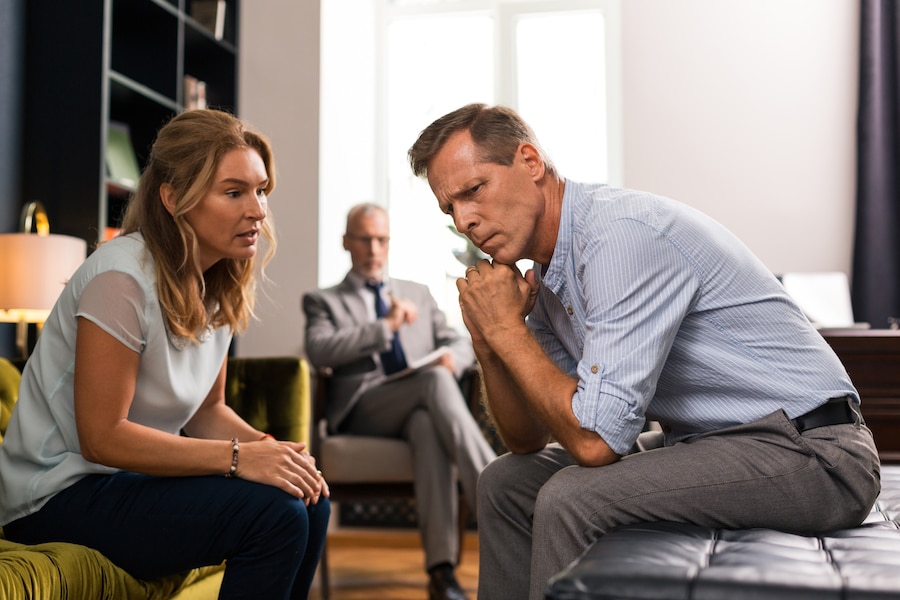Love is a powerful emotion that binds us together, offering joy, comfort, and a sense of belonging. But what happens when love collides with the destructive force of addiction? Can these two forces coexist in a healthy, fulfilling relationship?
The answer, unfortunately, is not a simple yes or no. Love and addiction can create a complex and often toxic dynamic. While genuine love can be a source of strength in recovery, addiction can distort and manipulate feelings, leading to a codependent relationship that hinders healing for both partners. Couples rehab in Orange County offers specialized programs designed to address the unique challenges faced by couples struggling with addiction, providing a supportive environment where both partners can heal and grow together.
Couples Rehab Services
Understanding the Dance Between Love and Addiction
At the heart of a healthy relationship lies mutual respect, open communication, and emotional support. However, addiction disrupts this balance. Here’s how:
- Obsessive Focus: Addiction becomes the primary focus, pushing aside other aspects of life, including the relationship. Partners become consumed with the highs and lows of the addiction, neglecting emotional intimacy and shared activities.
- Manipulation: People struggling with addiction often resort to manipulation to obtain their substance of choice. They may guilt trip their partners, make empty promises, or even steal money to fuel their addiction.
- Co-dependency: A codependent relationship is one where both partners’ happiness and well-being are contingent on the other’s behavior. In the context of addiction, the non-addicted partner might enable the addiction by making excuses, covering up lies, or taking responsibility for the addicted partner’s actions. This creates a cycle of dysfunction that hinders recovery.
The Illusion of Love: When Addiction Takes Center Stage
While the initial stages of a relationship might be filled with genuine love, addiction can twist this connection into a distorted form of attachment. Here are some signs to watch out for:
- Enabling Behaviors: Does your partner rely on you to handle their responsibilities or provide alibis for their actions? Are you constantly worried about their well-being, neglecting your own needs?
- Constant Drama & Emotional Rollercoaster: Does your relationship feel like a constant rollercoaster of highs fueled by the addiction and lows of withdrawal or consequences?
- Lack of Trust: Addiction thrives on secrecy and manipulation. Does your partner frequently lie to you or hide their substance use? Has trust eroded to the point where open communication is impossible?
- Isolation: You might find yourself withdrawing from friends and family to protect yourself from the chaos of your relationship or to avoid judgment.

Can True Love Survive Addiction?
The good news is that love, while not a cure for addiction, can be a powerful motivator for change. If both partners are willing to commit to recovery, a loving relationship can become a source of strength on the path to healing. Here are some key factors:
- Healthy Boundaries: Setting healthy boundaries is crucial. This means refusing to enable your partner’s addiction while still offering support for their recovery efforts.
- Open Communication: Honest and open communication is essential for rebuilding trust and addressing underlying issues.
- Individual and Couples Therapy: Therapy can provide tools for dealing with addiction triggers, identifying codependent patterns, and fostering healthier communication.
- Dual Recovery Programs: Couples rehab programs specifically designed for couples battling addiction can offer a safe space for healing together and learning how to support each other’s recovery journeys.
Moving Towards a Healthy Relationship
If you find yourself in a relationship with someone struggling with addiction, know that you are not alone. There are resources available to help you navigate this challenging situation. Here are some steps you can take:
- Educate Yourself: Learn about addiction and its impact on relationships. Understanding the underlying dynamics can help you make informed decisions.
- Focus on Your Own Well-Being: It’s impossible to help someone else recover if you’re neglecting your own needs. Prioritize self-care, therapy, and support groups for partners of addicts.
- Set Boundaries: It’s okay to say “no” to enabling behaviors and to prioritize your own well-being.
- Seek Professional Help: Consider individual therapy or support groups for partners of addicts. A therapist can guide you towards healthy coping mechanisms and empower you to make informed decisions about your relationship.
- Consider Couples Rehab: If both partners are committed to recovery, couples Rehab programs offer a structured approach to healing together and creating a healthier relationship dynamic.
Remember, You Deserve a Healthy, Fulfilling Relationship
Staying in a relationship with someone struggling with addiction doesn’t automatically mean you don’t love them. However, it’s crucial to recognize when love has become entangled with codependency and dysfunction. Choosing to prioritize your own well-being and seeking support is not an act of abandoning your partner; it’s the first step towards creating a foundation for a healthier future, whether together or apart. Contact us today to explore how we can provide you with the support and guidance you need to navigate these challenges and make decisions that are best for you and your loved ones.
FAQS
- Can love coexist with addiction in a relationship?
- Love and addiction can create a complex dynamic in a relationship. While genuine love can provide strength and motivation for recovery, addiction often distorts feelings and leads to a codependent relationship that hinders healing for both partners.
- What are some signs of a codependent relationship affected by addiction?
- Signs of a codependent relationship affected by addiction include obsessive focus on the addiction, manipulation, enabling behaviors, constant drama and emotional rollercoasters, lack of trust due to secrecy and lies, and isolation from friends and family.
- Can true love survive addiction?
- True love can be a powerful motivator for change in addiction recovery. If both partners are committed to recovery and willing to set healthy boundaries, engage in open communication, seek therapy, and consider couples rehab programs, a loving relationship can become a source of strength on the path to healing.
- What steps can partners take to navigate a relationship affected by addiction?
- Partners can take steps such as educating themselves about addiction, prioritizing their own well-being through self-care and therapy, setting boundaries to avoid enabling behaviors, seeking professional help, and considering couples rehab programs if both partners are committed to recovery.
- Is it okay to prioritize my own well-being in a relationship affected by addiction?
- Yes, prioritizing your own well-being is crucial in a relationship affected by addiction. Neglecting your own needs can prevent you from effectively supporting your partner in their recovery journey. It’s important to set boundaries and seek support to ensure your own mental and emotional health.
- How can I determine if my relationship is healthy or codependent?
- A healthy relationship is characterized by mutual respect, open communication, and emotional support. In contrast, a codependent relationship revolves around enabling behaviors, manipulation, and lack of boundaries. Seeking guidance from a therapist can help you evaluate the dynamics of your relationship.
- What should I do if I suspect my partner is struggling with addiction?
- If you suspect your partner is struggling with addiction, encourage them to seek professional help and offer your support. It’s essential to approach the situation with empathy and understanding while setting boundaries to protect your own well-being.
- Are there resources available for partners of addicts?
- Yes, there are resources available for partners of addicts, including support groups, therapy, educational materials, and couples rehab programs. These resources can provide guidance, support, and coping strategies for navigating the challenges of loving someone with addiction.
- What role does communication play in a relationship affected by addiction?
- Open and honest communication is essential in a relationship affected by addiction. It allows partners to express their needs, address concerns, and work together towards recovery. Effective communication can help rebuild trust and strengthen the bond between partners.
- How can couples rehab programs help partners struggling with addiction?
- Couples rehab programs offer a structured approach to healing together and creating a healthier relationship dynamic. These programs provide therapy, support, and resources tailored to the unique needs of couples affected by addiction, fostering a supportive environment for recovery.

